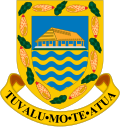 |
|---|
The Speaker of the Parliament of Tuvalu is the presiding officer of the Parliament of Tuvalu. [1] [2]
The annual salary of the speaker is AU$ 44,004 / US$ 28,900 per year. [3]
 |
|---|
The Speaker of the Parliament of Tuvalu is the presiding officer of the Parliament of Tuvalu. [1] [2]
The annual salary of the speaker is AU$ 44,004 / US$ 28,900 per year. [3]
| # | Name | Term | Notes |
|---|---|---|---|
| 1 | Sione Tui Kleis | 1976–1977 | [4] |
| 2 | Tupua Leupena | 1978–1978 | [5] |
| 3 | Elia Tavita | 1978–1981 | [6] [7] |
| 4 | Vave Founuku | 1981–1989 | [8] [9] [10] [11] |
| 5 | Kokea Malua | 1989–1993 | [9] |
| 6 | Tomasi Puapua | 1993–1998 | [12] |
| 7 | Tomu Sione | 1998–2002 | [13] |
| 8 | Saloa Tauia | 2002–2003 | [14] |
| 9 | Faimalaga Luka | 2003 | [15] |
| 10 | Otinielu Tausi | 2003–2006 | [16] |
| 11 | Kamuta Latasi | 2006–2010 | [17] [18] [19] |
| 12 | Isaia Italeli | 2010 | [18] |
| (11) | Kamuta Latasi | 2010–2014 | [18] |
| (10) | Otinielu Tausi | 2014–2019 | [20] [21] [22] |
| 13 | Samuelu Teo | 2019–2024 | [23] [24] |
| 14 | Sir Iakoba Italeli | 2024– | [25] |